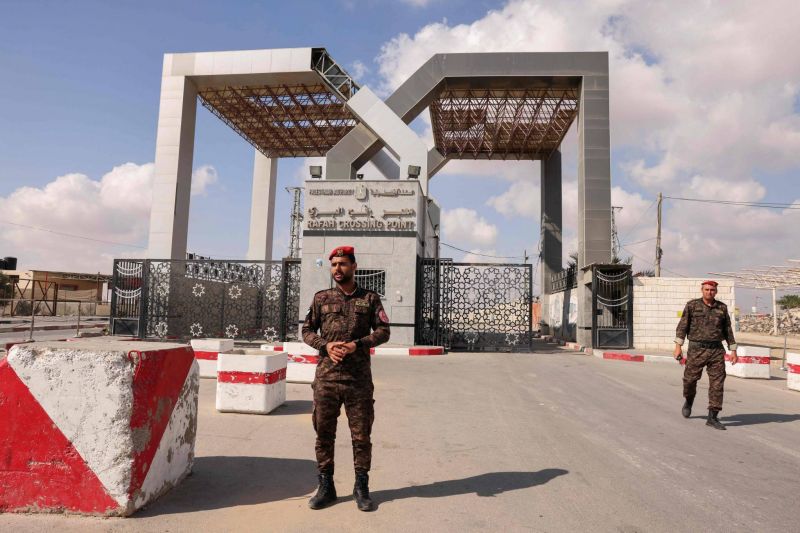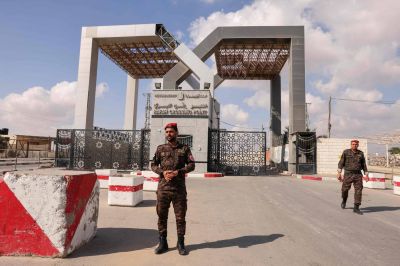
Palestinian security agents at the Rafah border crossing with Egypt on August 23, 2021, in Gaza. (Credit: Said Khatib/AFP).
On the 11th day of the war between Hamas and Israel, hundreds of Palestinians in the Gaza Strip are waiting at the Egyptian border for the opening of their only exit— the Rafah crossing point.
Rafah is Palestinians' only way out of Gaza as they continue to suffer incessant Israeli bombardments since Hamas launched operation “Al-Aqsa Flood” on Oct. 7. But the crossing is also a gateway for international humanitarian aid piling up in the town of Arish in Egypt's Sinai.
The more time goes by, the more critical the Rafah crossing becomes. Why is this crossing point so important? Nael Shama, an international relations researcher who focuses on Egypt's foreign policy, explains the situation further to L'Orient Today.
What is the Rafah crossing and how is it normally used?
The Rafah crossing is the only point of connection between the Gaza Strip and Egyptian territory, more precisely the Sinai Peninsula. It is currently under the control of Egyptian authorities, in particular their intelligence services. It is important to note that this crossing point is strictly reserved for the transit of people and does not allow the transport of goods.
This decision was made after the withdrawal of Israeli troops from the Gaza Strip in 2005 with the aim of ensuring that Palestinians did not become dependent on humanitarian aid from Egypt. This also made it possible to prevent the Israelis, who at the same time continued to occupy Palestinian territories, from definitively ceasing their assistance to the Gaza Strip and assuming their responsibilities as an occupying force [by supplying water, electricity, etc.].
It should be noted, however, that only a limited number of travelers are authorized to cross [Rafah], mainly for educational reasons and other specific needs that Israel needs to approve first.
(Credit: Guilhem Dorandeu/L'Orient Today)
Why is the Rafah crossing currently blocked?
Before Hamas was elected to power in the Gaza Strip in early 2006, the crossing was managed by a convention bringing together Palestinian forces, the Egyptian government and Israel.
But since the Israeli withdrawal in 2005, the Rafah crossing has generally been closed, opening only for periods limited to a day or two per week, or even every ten days.
Today, Egypt refuses to open the Rafah crossing for Palestinians to flee Gaza for several reasons. According to the government, the main reason is that Egypt does not want to face an indefinite refugee crisis.
Additionally, a group of Egyptian nationals recently formed an organization called Wilayat Sinai and pledged allegiance to the Islamic State terrorist group.
This group has carried out several terrorist attacks against the Egyptian state in the Sinai region. The entry of Palestinian groups and Hamas into this region could therefore lead to “national security” problems, as Egyptian Foreign Minister Sameh Shoukry recently highlighted, in light of the events.
Is this the only way out for Gazans?
Yes. This is the one and only lifeline for Palestinians living in the Gaza Strip, while water, gas, electricity and humanitarian aid have been cut off from the territory due to the complete blockade imposed by Israel since the start of the war.
In addition to the humanitarian aid waiting behind this crossing, Egypt is also preparing to build temporary hospitals in the desert to temporarily treat, in small numbers, war-wounded Palestinians once the passage is open.
The importance of Rafah today lies in several aspects. First of all, it is crucial because of its geopolitical importance. Gaza is a densely populated region, while the Sinai Desert is very sparsely populated.
This has led to suggestions by Israeli leaders, on several occasions, to move Gazans to this desert in an effort to better control weapons in the Gaza Strip. Audio recordings were even leaked from the term of Egyptian President Hosni Mubarak, in which current Israeli Prime Minister Benjamin Netanyahu proposed this option, which Mubarak categorically refused.
However, in case of a possible land invasion by Israel, it is likely that thousands of Gazans would seek to force the crossing open to flee to Egypt.
To avoid such a situation, the Egyptian government is ready to open Rafah to allow humanitarian aid to enter the Gaza Strip.
Currently, more than 100 humanitarian aid trucks from various countries, including Egypt, Jordan and several international organizations, are waiting to pass through, but this is currently impossible due to Israeli bombing near the crossing.
Finally, Rafah is at the heart of diplomatic discussions between the United States and the Egyptian government. The Americans offered to evacuate their nationals from Gaza via this crossing, which Egypt accepted, making it a condition that this exit be accompanied by the delivery of humanitarian aid to the Gazans.
Nothing concrete on this subject has been decided so far and discussions are still ongoing.


